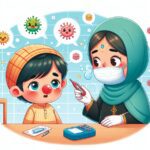Diphtheria is a term that might sound distant and somewhat old-fashioned, but it represents a threat that remains relevant to children’s health today. As new parents, understanding this condition is crucial for safeguarding your child’s well-being. This article delves deep into what Diphtheria is, its symptoms, how it’s treated, and most importantly, how you can prevent it. Armed with the right information, you can ensure your child remains healthy and protected against this potentially dangerous disease.
What is Diphtheria?
Diphtheria is a bacterial infection caused by the bacterium Corynebacterium diphtheriae. It primarily affects the throat and upper airways and produces a thick covering in the back of the throat. This covering can lead to difficulty breathing, heart failure, paralysis, and even death. The bacteria produce toxins that can damage human tissues in the respiratory system, and if left untreated, these toxins can spread to other organs.
The disease is highly contagious and can spread through direct contact or through the air via respiratory droplets when an infected person coughs or sneezes. Fortunately, widespread vaccination has made Diphtheria rare in many parts of the world. However, it’s still prevalent in countries with low vaccination rates. According to the Centers for Disease Control and Prevention (CDC), maintaining high vaccination coverage is essential to prevent outbreaks.
Signs and Symptoms of Diphtheria
Recognizing the symptoms of Diphtheria early is key to ensuring prompt treatment and recovery. The initial signs of Diphtheria can be easily confused with those of a common cold. They include a sore throat, mild fever, and chills. However, as the infection progresses, more distinct symptoms emerge:
- A thick, gray coating on the throat and tonsils
- Difficulty breathing or rapid breathing
- Changes in voice or loss of voice
- A rapid heartbeat and signs of heart failure
- Swelling of the neck (often described as ‘bull neck’)
- Nausea and vomiting
If you notice any of these symptoms in your child, it’s crucial to seek medical attention immediately. Early diagnosis and treatment can prevent the most severe consequences of the disease.
Treating and Preventing Diphtheria
Treatment for Diphtheria involves a two-pronged approach: neutralizing the toxins produced by the bacteria and eradicating the infection itself. To neutralize the toxins, doctors administer diphtheria antitoxin, a medication not commonly used for other diseases. Alongside, antibiotics such as penicillin or erythromycin are prescribed to clear up the infection.
Prevention, however, is always better than cure, especially when it comes to infectious diseases like Diphtheria. The primary method of prevention is vaccination. The Diphtheria, Tetanus, and Pertussis (DTaP) vaccine is typically administered in multiple doses during childhood. For ongoing protection, booster shots are recommended for adults. Maintaining high vaccination rates within communities is crucial to preventing the spread of Diphtheria and protecting those who are most vulnerable.
Adhering to good hygiene practices can also help reduce the spread of Diphtheria. This includes teaching children to cough and sneeze into their elbows and washing hands regularly. In areas where Diphtheria is more common, avoiding close contact with sick individuals and seeking prompt medical care for respiratory symptoms are important preventive measures.
FAQs About Diphtheria for Concerned Parents
As a new parent, you might have numerous questions about Diphtheria. Here are some frequently asked questions to help you understand more about this disease:
- Is Diphtheria still a risk for my child? Yes, despite being rare in many countries due to vaccination, Diphtheria can still pose a risk, especially in areas with low vaccination rates.
- How can I ensure my child is protected against Diphtheria? Ensuring your child receives the DTaP vaccine according to the recommended schedule is the best way to protect them against Diphtheria.
- What should I do if I think my child has been exposed to Diphtheria? If you suspect your child has been exposed to Diphtheria, seek medical advice immediately. Early treatment is crucial for recovery.
- Can adults get Diphtheria? Yes, adults can get Diphtheria. Booster shots are recommended to maintain immunity.
For more information on related topics, consider exploring articles on vaccinations, immunizations, and understanding antibiotics reactions to keep your child healthy and well-informed.
Armed with the right knowledge and resources, you can play a crucial role in preventing Diphtheria and safeguarding your child’s health. Remember, vaccination is key to protection, so ensure your child’s vaccinations are up to date, and consult healthcare professionals for advice tailored to your child’s health needs.













